- Home
- Francine Rivers
Her Daughter's Dream Page 12
Her Daughter's Dream Read online
Page 12
“Breakfast is ready.”
Breakfast? Hadn’t she been peeling potatoes for dinner?
Dad sat at the kitchen table. Charlie’s death had aged him. His hair had turned gray at the temples, and he had new lines across his forehead, around his eyes, and in his cheeks, lines carved by sorrow. She met his eyes briefly and bowed her head. He started to rise and seemed to change his mind. He put his hand flat on the table. “Sit down.”
Mom set two plates on the table, one in front of Dad, one in front of Carolyn. Carolyn stared at the mound of scrambled eggs, four strips of bacon, a blueberry muffin. Mom filled her glass with orange juice. She couldn’t remember the last time she’d had juice.
Setting her own plate on the table, Mom sat. Dad said grace.
“You slept thirty-six hours.”
Carolyn raised her head and looked at her father.
“You must’ve needed it.” He forked eggs into his mouth, not looking at her.
“You need to eat, too.” Mom waved at the plate.
Carolyn’s hand shook when she picked up the fork, and her teeth hurt when she chewed. Her throat felt so dry she had to swallow orange juice to wash down the muffin. Though they didn’t stare, she felt her parents’ attention fixed on her. What thoughts ran through their heads? What names did they want to call her? Druggie. Boozer. Hippy. Worthless slut.
All true.
They didn’t ask questions; the silence became excruciating. She’d prepared herself for anger, accusations, fury, fingers pointed at the door, but not this watchful tension, this nervous caution.
She’d been sent home by Jesus, bus fare paid by one of His saints. Now what? What could she say? What excuses could she offer?
She couldn’t eat any more. She put her fork down carefully, head still bowed. She put her hands on the table, meaning to push the chair back. Dad grabbed her hand, pinning her at the table. “We’re glad you came home, Carolyn.” His voice sounded rough and hoarse. “You know that, don’t you?”
She raised her head and looked at him.
“We’re glad you’re home,” he repeated.
She pulled her hand away and covered her face. She gulped down a sob.
How long had she been running on empty? Since she’d run from Berkeley . . . or long before that? She’d tried to fill the void, but nothing had worked—not alcohol, not drugs, not sex. All of it emptied her even more.
She had one miraculous moment to cling to in all that mess. One single minute at dawn, the May flowers blooming like stars in the grass, and Jesus laying His hand on her head. Telling her it was time to go home.
Jesus. They’d never believe it, not in a thousand years. They’d think she’d had some kind of drug-induced hallucination.
A sound came out of Dad, ripped out.
“Trip.” Mom spoke, frightened.
He pulled Carolyn’s chair back. When she almost fell, he swept her up and sat down again with her in his lap. Hugging her tight against him, he wept.
15
Mom and Dad stayed home from work. She knew they wanted to ask why she had disappeared, but didn’t, perhaps waiting for her to volunteer the information. She hadn’t been thinking about them, the grief they must have suffered, and the further grief she might cause. She hadn’t thought about anything at all. How could she tell them that she simply couldn’t bear seeing Charlie in a coffin?
“Oma’s visiting Rikka back in New York. Your aunt is having another showing. We called them last night to let them know you’d come home.”
What would Oma say when she returned?
“I went to San Francisco a half-dozen times,” Dad told her. “I thought you might be in Haight-Ashbury.”
She’d been drunk or stoned most of the time. She hadn’t even stepped outside the house that first month. They left shortly after that. “Chel and I lived on Clement Street.”
“Is she still there?” Dad sounded worried. Maybe he thought she’d change her mind and go back.
“She died of an overdose.”
“What a waste.” Mom’s words summed up everything.
They gave up trying to make conversation and did chores around the house. Carolyn felt at loose ends, not knowing what to do. When she tried to help with the dishes, Mom told her to go into the living room and relax, but Dad had the TV on and Carolyn didn’t want to hear the news. The Vietnam War was still going strong, more unpopular than ever.
She took a nap in the afternoon. Even after hours of sleep, she felt tired.
Mom awakened her. “Dad just brought Oma home from the airport. Why don’t you go over and say hello?”
Oma stood on her front porch, watching Carolyn walk across the lawn. Dad gave her an encouraging smile as he headed for the house. When Carolyn came close, Oma put her hands on her hips. “Die Verlorene kommt schliesslich nach Hause.”
Carolyn gave her a bleak look.
“I said, ‘The prodigal finally comes home.’” She let out her breath. “I’d like to beat you to within an inch of your life, but you already look like you’ve been through enough. Come inside. We’ll have some tea and talk.”
Oma filled the teakettle and slammed it on the stove. She spoke German again and corrected herself. “I haven’t any cookies, not even store-bought. Tomorrow, I’ll make a cake. You look terrible. Did they tell you that?”
“No.”
“Well, you do. You’re skin and bones! What have you been eating? air?”
“Trash.”
Oma scowled. “You look it. Do you know what you’ve done to your mother and father and me with all your foolishness?”
“I’m sorry.”
“Sorry. Sorry!” She closed her eyes and shook her head. She sank into the chair as though her legs wouldn’t hold her up anymore. “It was my fault. I should have come to Berkeley and told you in person, brought you home with me.”
“It wasn’t your fault, Oma.”
“Tell me where you’ve been all this time and what you’ve been doing.” She waved her hand. “And I don’t mean San Francisco.”
“You don’t want to know, Oma. You really don’t.” Carolyn struggled to keep tears back.
She sighed heavily. “I guess it’s none of my business anyway.” She raised her head. “What happened to Chel?”
Leave it to Oma to ask. “Heroin overdose.” Carolyn swallowed hard. “Suicide.”
Oma looked ready to cry. “Too many young people are dying these days.”
“Where’s Charlie buried?” Carolyn hadn’t dared ask her parents.
“He could’ve been buried at Arlington, but your parents wanted him up on the hill, close to home.” Carolyn thought about Charlie and figured Mom and Dad had made the right decision. “Hildemara—” Oma corrected herself. “Your mother went up every day for the first year.”
“Can I take some flowers when I go?”
“Cut as many as you want. Anytime.” Oma got up and poured hot water over the tea bags and set the cups on the table. “Take a bottle of water along. You’ll need to refill the vase.”
They sipped tea together. Oma set her cup down. “What do you plan to do now?”
“I don’t have any idea.”
“You’re going to have to do something. Sitting around is the worst thing you can do for yourself.”
“I know.”
Oma stood behind her, stroking her shoulders. She held Carolyn’s head and kissed her crown like a blessing. “Every day is a new beginning, Liebling.”
* * *
Carolyn heard Mom and Dad talking in the morning.
“Maybe I should stay home a few more days.”
“You can’t keep watch forever, Hildie. Besides, your mother will be here. She’ll keep an eye on her.”
When Carolyn opened the door, they stopped talking. Dad was wearing his uniform. She felt relieved to see him in it. They’d been treating her like a guest.
“I’ve got to go into town and do some grocery shopping.” Mom sounded apologetic. “Would you like to go
with me?”
And have everyone in town staring at her? “I’d rather stay here.”
After they both left, Carolyn went through the house. She couldn’t find a single picture of herself anywhere. Mom and Dad might have had only one child—Charlie.
She wrote a note and left it on the kitchen counter. She went over and cut flowers from Oma’s garden and walked to the cemetery. The gate had been opened so people could drive in, make the loop, and come out. Few did. Carolyn had been here before, exploring with Charlie, and never seen the caretaker.
It took some wandering before she found Charlie’s grave. He rested on the slope facing town, a row up from the iron fence, a small American flag on the headstone.
Kneeling, Carolyn removed the dead flowers, refilled the black vase with water, and arranged the fresh bouquet. Looking at the patches of golden California poppies and blue and white lupines dripping like splashed paint down the hillside, she started to talk. She cried, too. She told her brother how she’d run away the day she heard he’d been killed. She told him about the veteran she met in the park and Jesus touching her in the morning. She told him about Mary and little Charlie and Sadie and the ducks swimming on the pond.
After a while, she even told him about Dock.
She felt better for all of it, purged.
Oma stood at the end of the drive, taking mail out of the box. “You must be hungry. You’ve been gone for hours. Come on up to the cottage. I’ll fix you lunch.” She sorted the mail as they walked up the driveway together. “Your mom called. She was worried when you didn’t answer the phone.”
“I left a note.”
“I know. I saw it. I called and let her know where you went.”
“I confessed all my sins to Charlie.” She tried to make light of it.
“He’ll keep your secrets.” She handed her a few envelopes. “Put those on the kitchen counter and come on over.”
After lunch, Carolyn sat on the floor in Oma’s small living room and fingered puzzle pieces. She raked fingers through her hair and stared at the hundreds of pieces. Nothing seemed to fit. “I don’t know what I’m going to do, Oma.”
“You’re going to eat right and get your health back. You’re going to stop kicking yourself. You’re going to get up and put one foot in front of the other and get on with your life. That’s what we all have to do.”
“You make it sound easy.”
“Nothing is easy, Carolyn. Life isn’t easy. We do the best we can with what God gives us.”
“I’ve made a complete mess of everything.”
“It’s not about what you’ve done. It’s about what you’re going to do now.”
* * *
Mom, Dad, and Oma took her to church. Everyone greeted her parents affectionately and then greeted her, too, eyes curious. Some talked about how they remembered her as a little girl.
“So shy and quiet. Such a pretty little thing.”
“I remember when you came to my Sunday school class the first time. You didn’t say a single word. You haven’t changed much.”
A lie they all wanted to live with.
Oma tucked her arm through Carolyn’s and stood closer. “Why don’t we find a seat?”
Carolyn felt strangely at home. She closed her eyes and listened to the choir. She listened so intently to Rev. Elias’s prayer, she felt as though she knew what words he’d speak before he said them. She listened to every word of the sermon. The message seemed to have new meaning after her experience in the park. She knew the One he talked about now. It all made sense. She had been blind. Now, she could see, even with her eyes closed. She had been deaf; now she could hear.
When the service ended, Carolyn made the long walk to the back door, where Rev. Elias stood, accepting parishioners’ thanks for an excellent sermon. He spoke warmly to her parents and Oma. The smile didn’t reach his eyes when he looked at her. “Carolyn.”
“It was a wonderful sermon, Rev. Elias.”
“How would you know? You slept through it.” He spoke tersely, then smiled at the people behind her. She took the hint and went out the door and down the steps.
Carolyn kept going to church, but kept her eyes open. She looked at Rev. Elias, hoping he knew she was paying close attention. She didn’t feel Jesus’ presence in the building, although she saw Him in her parents and Oma and some of the people who talked with her. She felt closer to God in the cemetery sitting beside Charlie’s grave or sitting on the swing her father had built. And she clung to the memory of her encounter with God in Golden Gate Park at dawn, May flowers blooming in the grass.
God loved her, even if no one else could.
16
Mom and Dad’s friend and dentist, Doc Martin, offered Carolyn a job as his receptionist, the last girl having quit the week Carolyn came home from San Francisco. Thelma, Doc’s wife, worked as the hygienist. Carolyn learned quickly that Thelma knew everyone’s business and didn’t mind sharing.
About a month into her job, Carolyn started to get nauseated every time she came to work. She’d always been bothered by the sounds of drills; now the scents turned her stomach. She tried to keep busy answering phone calls, calling patients to remind them of appointments, taking messages, but the smell of hot enamel sent her running for the bathroom.
Thelma tapped on the door. “Are you all right, Carolyn?”
She retched again. “I’ll be out in a minute, Mrs. Martin.” Fighting the nausea, she waited a moment and hoped her stomach wouldn’t heave again. She’d already lost her eggs and toast. Nothing else remained. She rinsed her mouth, patted her face with a damp paper towel, and opened the door.
Thelma stood right outside, expression curious. “You look awfully pale.”
“I’ll be all right.” The telephone rang and she hurried to answer. Feeling woozy, she slid quickly into the office chair and picked up her pencil. She could feel Thelma’s eyes fixed on her back. She jotted another message on the pad.
By lunchtime, she felt fine. The next morning, she felt sick again, and the morning after that. She wondered if she had grown allergic to something in Doc Martin’s office. Thelma, maybe. Just being around the woman made Carolyn anxious, but the thought of having to look for another job made her even more so.
When she threw up Saturday morning, she knew it didn’t have anything to do with the scents and sounds of the dentist’s office. So what was it? Mom heard her heaving and suggested saltines and 7UP. “They’ll settle your stomach.” They did.
At church the next morning, she had to leave the service. She barely made it outside before she puked in the bushes next to the front steps. Mortified, gulping for air, she straightened and saw her mother standing on the steps above her. “I think I need to lie down in the car, Mom.”
Mom walked her to the car. “How long has this been going on, Carolyn?”
“Two weeks.”
She paled noticeably. “Every morning?”
Carolyn shrugged. “It’s probably a flu bug or something.”
“I don’t think so.” Mom looked stricken. “As if things aren’t bad enough already.” She opened the car door. “We’re going to have to talk about this later. Don’t say a word about it to anyone, not even Oma, and especially not your father. Not yet.”
Carolyn slipped into the car.
“Let’s just hope you’re not pregnant.” Mom slammed the door and headed back to church.
Carolyn fought another wave of nausea. Pregnant? Ash had used her for weeks, but that had been months ago. After him, she hadn’t wanted anyone to touch her ever again. She’d been on the pill up until she left the Clement Street house. She’d left everything behind that day, but why would she have needed birth control when she stayed clear of people, except to beg?
The young veteran sitting on the seawall the night she wanted to commit suicide. He played the guitar. He’d given her a candy bar. They’d talked. He kept her warm all night.
She understood now why Mom had that look on her face, why she looked
ready to curse and cry, why she thought things were going to get worse.
Curling up on the backseat, Carolyn wept.
* * *
Dr. Griffith confirmed Mom’s suspicions. “She’s about six weeks along. I think it’d be wise to check for VD.”
Dad sat stunned at the dining room table. He looked like someone had punched him in the stomach. Pain first, then anger. He punched back. Hard. “Do you even know who fathered it?” He didn’t wait for an answer before cursing her. Mom whispered his name in an agonized voice, but he didn’t hold back. “Charlie would be ashamed to call you his sister! It’s better he’s dead so he can’t see what you’ve become.” He put his head in his hands and wept.
Charlie had died honorably, a hero deserving of a shrine. No shrine for Carolyn. She hadn’t seen a picture anywhere in the house, and she had looked. It would be worse now that she was the cause of the second-worst catastrophe a parent could suffer. “I’m sorry. I should’ve stayed in San Francisco.” She’d probably be dead by now, but maybe that would’ve been easier on everyone.
“Why didn’t you say something?”
She looked at Mom. “I didn’t know.” Not that that was any excuse. She felt the muscles tightening around her throat as though her own body tried to strangle her. The pain kept getting worse. She pushed it down the way she’d always done, but it was harder this time.
Dad scraped his chair back. “Maybe you’re right. Maybe you should’ve stayed in San Francisco. Maybe you should go back!”
“Trip!” Mom’s voice cracked.
“How are we supposed to fix the mess she’s made of her life? Tell me that!”
“Trip . . .”
He glared at Carolyn. “Get out of my sight!”
Carolyn got up and headed for the front door. Mom cried out, “No!” She came after Carolyn and gripped her by the elbow. “Don’t leave. Just sit in your room for a while; let me talk to him.” Carolyn turned like an automaton, guided by her mother’s firm hand.
Closed in, curled up on her bed, pillow over her head, she could still hear them shouting.
Chel came to her in her dreams that night. She walked into the surf. When she reached waist level, she turned and held out her hand. Carolyn followed. As the sea closed over her, she found she could still breathe. She swam among the seaweed, feeling the silky strands try to catch hold. She saw the young vet at the bottom playing the guitar. Charlie sat and listened. Chel sea-danced, her red hair floating around her.

 An Echo in the Darkness
An Echo in the Darkness A Lineage of Grace
A Lineage of Grace The Prince: Jonathan
The Prince: Jonathan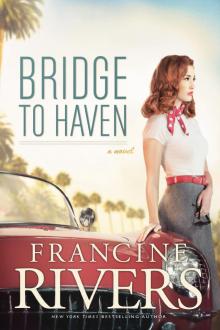 Bridge to Haven
Bridge to Haven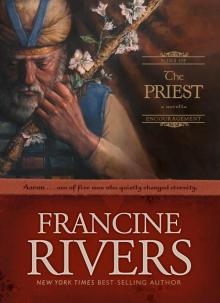 The Priest: Aaron
The Priest: Aaron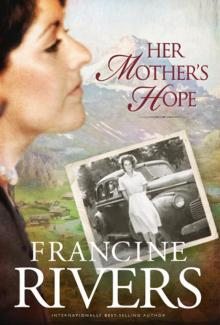 Her Mother's Hope
Her Mother's Hope Redeeming Love
Redeeming Love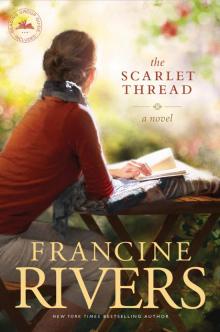 The Scarlet Thread
The Scarlet Thread The Masterpiece
The Masterpiece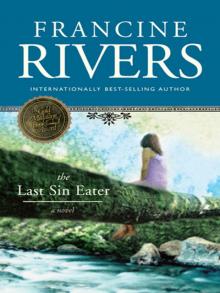 The Last Sin Eater
The Last Sin Eater The Prophet: Amos
The Prophet: Amos As Sure as the Dawn
As Sure as the Dawn Her Daughter's Dream
Her Daughter's Dream A Voice in the Wind
A Voice in the Wind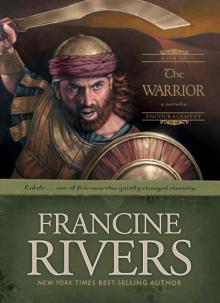 The Warrior: Caleb
The Warrior: Caleb The Scribe: Silas
The Scribe: Silas And the Shofar Blew
And the Shofar Blew The Atonement Child
The Atonement Child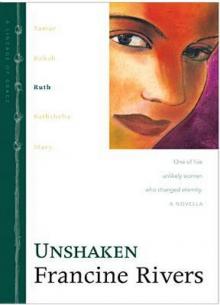 Unshaken_Ruth
Unshaken_Ruth Unspoken_Bathsheba
Unspoken_Bathsheba The Scribe
The Scribe Sons of Encouragement
Sons of Encouragement The Shoe Box
The Shoe Box Sycamore Hill
Sycamore Hill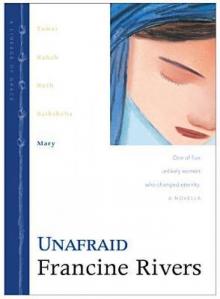 Unafraid_Mary
Unafraid_Mary Marta's Legacy Collection
Marta's Legacy Collection